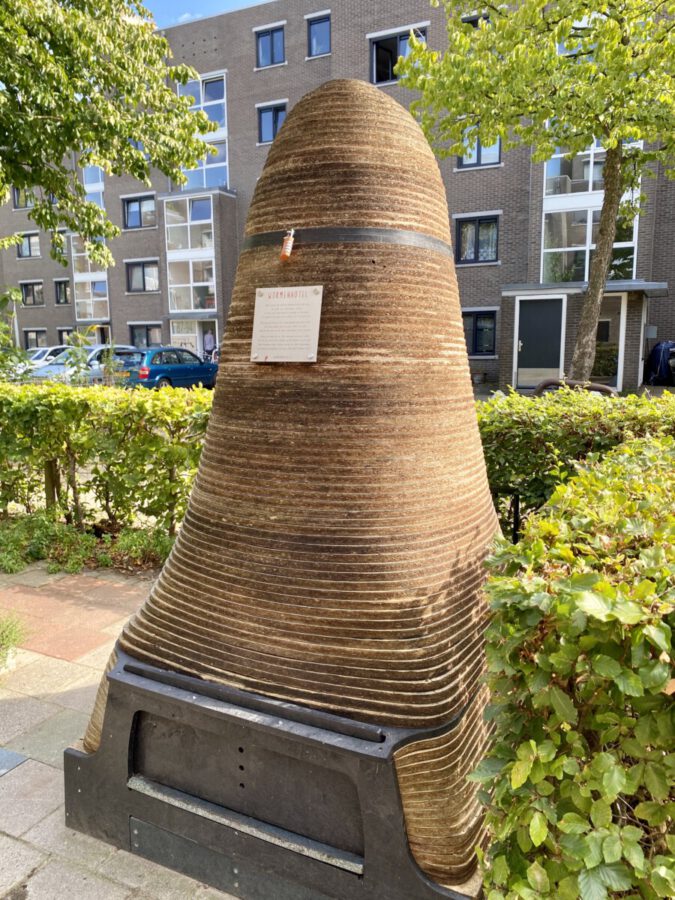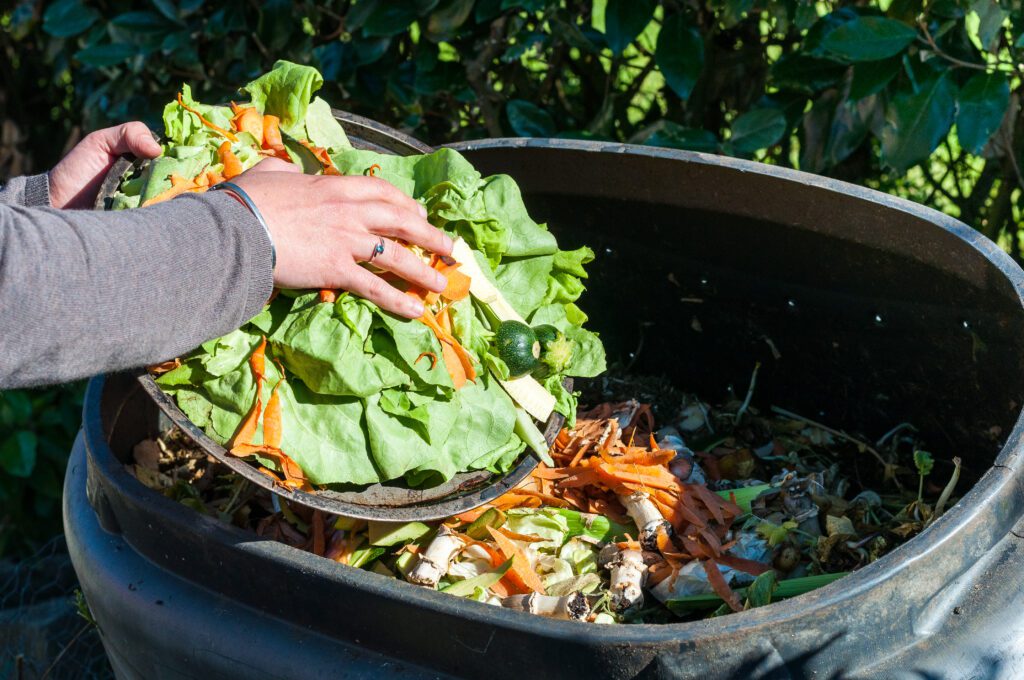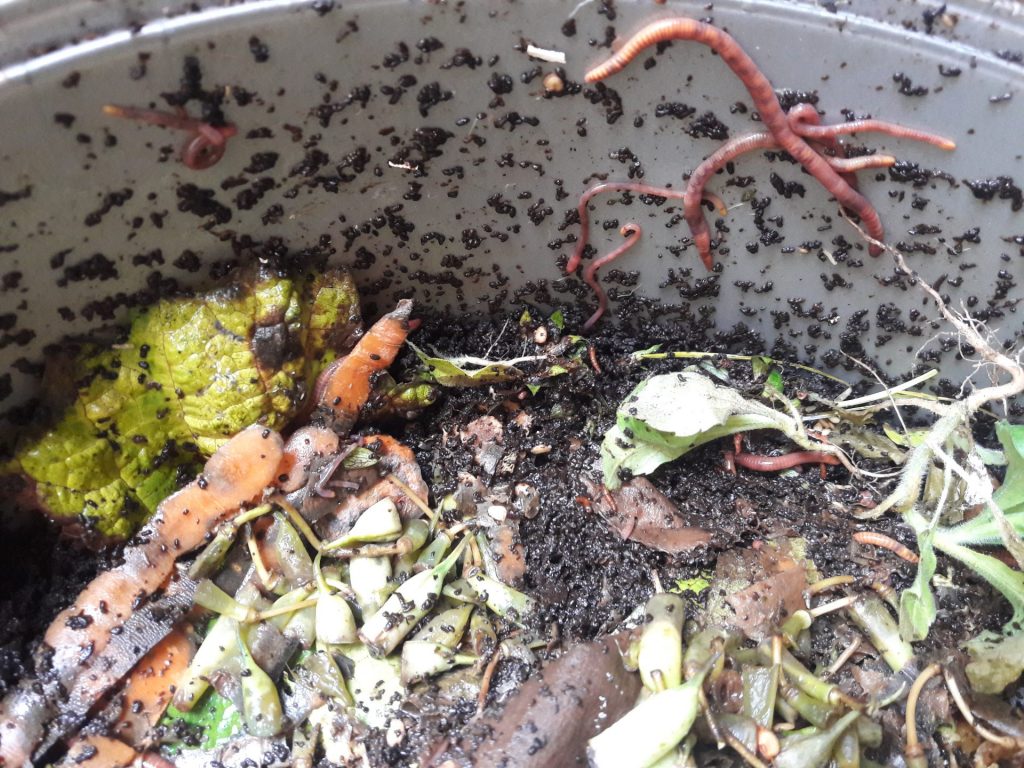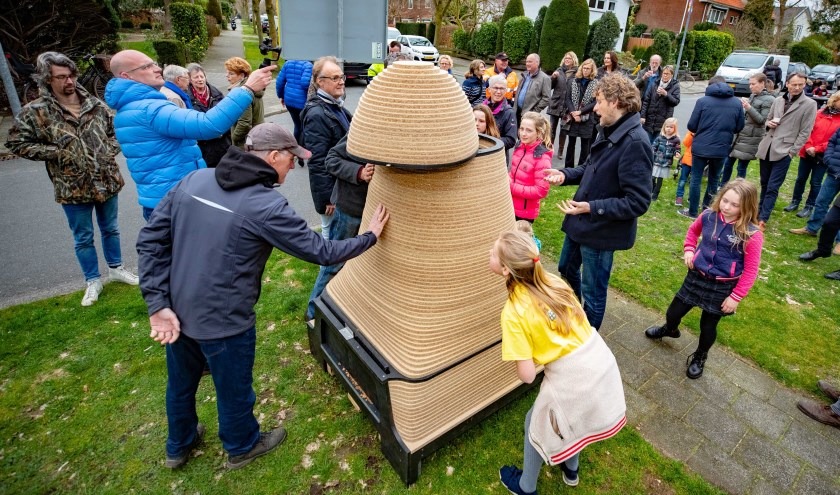Community composting is taking off in the Netherlands. So far, its effectiveness in addressing food waste has only been surpassed by its social benefits. And the unsung hero behind it all? Worms.
Worm hotels — if you don’t already know what they are, are not a place for sleepy-eyed worms to check in for the night after a long day of travelling.
Surprisingly, it’s actually the worms that are running the hotel, and your food waste is the guest. 🍎
Your apple cores and eggshells check in for a several-month stay and then leave refreshed and ready for their new life as a nutrient-rich fertiliser.
If that’s news to you, you’ll be very surprised to hear that Amsterdam is full of these slithering food waste retreats.
What are worm hotels?
Worm hotels are everything urban composting should be: easy to use, accessible, compact, and community-oriented.
They bring nature to the city and are rife with opportunities for education and community-building.
Worm hotels offer an optimistic alternative to traditional throw-away culture, proving that household waste can become gardening gold. They’re the hot new project that’s bringing neighbours together all throughout the Netherlands.

Worm hotels are composting containers generally about two metres high. They’re each home to several kilos of tiger worms, earthworms, and red dung worms, and food waste from around 1,500 households (in Amsterdam alone!). 🪱
Under the right conditions, they produce rich compost that can be added to any garden. Often, neighbours manage the hotel together, sharing in both the maintenance and rewards.
It’s a chance to socialise, work together, and do something good for the environment.
READ MORE | Recycling in the Netherlands: an international’s guide
DutchReview spoke with Arie Machgeels van Ziel, architect and composter from Wormenhotels, for the low-down on the Dutch vermiculture craze. He explained that worm hotels don’t come in just a one-size-fits-all model.
You can find them in all shapes and sizes, but the most common are those supplied by the Amsterdam municipality.
These large, bell-shaped structures that resemble a beehive are made from a durable, natural pressed material called eco-board. They’re designed to be eye-catching and to spark conversation among neighbours.
While these impressive structures are truly something to marvel at, don’t be intimidated — an old plastic bucket works too. What’s important is that the worms can’t escape, and pests can’t get in.
That, and just the right balance of humidity, airflow, carbon matter, darkness, and temperature (between 5 and 25 degrees Celsius). The result of this delicate ambience is a stink-free, pest-free worm utopia.
How did they start in Amsterdam?
Unfortunately, organic waste separation is not yet a standard for waste collection in the Netherlands — massive amounts of compostable material end up in the waste bin every day.
The initiative for worm hotels came from community members and officials in Amsterdam as a way to address this issue.
The hotels caught on quickly, and they have since developed into a city-wide project for the municipality.
Van Ziel says their work references the model from the American book, Community-Scale Composting Systems. It emphasises closing the food system loop and describes around 250 community composting projects in the US.
With this inspiration and his own calculations in mind, he anticipates that within 10 years, all of Amsterdam’s organic waste will be able to be converted into soil — not through worm hotels alone, but also by large-scale city-wide efforts.

The new city composting model would include large underground collection bins. They’d be similar to those already present for recycling and waste.
Since worms do the work of breaking down the waste, compost only requires one truck to pick up waste, instead of the 70 currently making waste pick-ups every year.
This goal sounds ambitious, but Van Ziel has no doubt it’s possible. He says they may be further behind on neighbourhood worm hotels, but with their larger-scale community composting projects, they will soon “really be able to start making a serious difference.”
Popular demand
Currently, there are an estimated 200 worm hotels speckled throughout Amsterdam. The popularity has grown so immensely that the municipality is having a difficult time keeping up with the demand.
The current waiting list has a queue of around 300 other composting enthusiasts for a new bin. Fortunately, up to 30 households can participate in one hotel, so see if you can join the one nearest you.
READ MORE | 7 innovative Dutch projects for a sustainable future
And it’s not just Amsterdam and Rotterdam where communities are focused on composting. Other cities are participating as well, with more and more municipal and citizen initiatives popping up throughout the country.
You can find worm hotels in at least 11 other cities throughout the Netherlands, including Rotterdam, The Hague, Eindhoven, and Haarlem. If your city doesn’t have one yet, you can put in a request with your municipality.
How exactly do worm hotels work?

Local residents stop by, leaving their organic waste at the hotel (the composting container/cabinet/beehive thing). The diligent worms eat, poo, and convert the scraps into vermicompost (worm poo with a touch of fungi, bacteria, and other organic matter).
The compost can be harvested after about four months, but it’s even better if left for at least six. It’s then ready to be mixed with your garden soil or added to your planters.
The municipality offers specific guidelines on just what materials you can and can’t check into your worm hotel.
Can go in:
- Uncooked, organic kitchen waste such as peels, vegetables, tea bags, coffee grounds, and eggshells
- Crushed cardboard, egg cartons, paper kitchen roll
- Garden waste
- Faeces of small vegetarian pets such as hamsters and guinea pigs
Can’t go in:
- Meat
- Pasta and bread
- Oil or sauce-cooked food
- Dog faeces, cat faeces and litter
- Bulky garden waste
- Cut flowers (flowers from your own garden are allowed)
The kitchen scraps and garden waste should be “optimised” (cut into small pieces), and then go into the bin with the worms, bedding, and living material. The bedding can be a variety of dry materials, like hay, shredded newspaper, sawdust, or dry leaves.
Living material is generally just compost, which contains beneficial micro-organisms like fungi and bacteria. Together, these materials create carbon — an important element in decomposition.
That’s as technical as it gets! Basically, give the worms the right environment, and they’ll take over from there.
What are the benefits?
The environmental benefits are clear and simple: reducing waste and improving soil conditions with organic fertiliser. The social benefits are just as far-reaching.
A recent study on the effectiveness of the worm hotels in Amsterdam shows:
- The worm hotels draw positive attention to circular waste flows and sustainable life.
- Participants feel more social cohesion in their neighbourhood.
- The projects contribute to local employment, including people with a disadvantage in the labour market.
- The worm hotels allow the municipality of Amsterdam to gain confidence with regard to organic waste separating (proving that Amsterdammers are willing to separate their waste).
Most importantly, people love them.
Plus, the compost itself is first-rate. A special feature of vermicompost is that the worm castings add valuable life to the soil.
“They’re a feedstock for bacteria, fungi and other invisible creatures,” according to Van Ziel. Regular compost adds nutrients to the soil, whereas worm compost actually helps the plants absorb the nutrients and stimulates the growth process.

He’s seen cases where it’s actually doubled or tripled a harvest, compared to regular compost. “It’s all about creating the right balance.”
Van Ziel says a common misconception is that you need to add a lot of compost to your soil. Vermicompost is strong, so it should only make up 5-10% of your soil — that also makes it great for sharing.
How to get involved
If you’re interested in getting involved in an existing worm hotel, check the Amsterdam municipality’s neighbourhood composting map. You’ll be able to locate the bin nearest you and see if there’s space to join.
If you live outside of Amsterdam, wormenhotel.nl has a similar map that covers not only Amsterdam but the entire lowlands. These maps also include the contact information you’ll need to get in touch.
If you’re feeling like doing some handy work, you can even build your own worm hotel. 👇
Van Ziel’s number one tip for new composters: “Just start.”
He says, “People are often afraid of something going wrong, but nature takes care of you in mysterious ways sometimes. If you just pile on your organic waste, it will automatically start decomposing.
It’s a slow process, so you’ll have plenty of time to steer things along the way.” Get started, and you’ll be sucked down the wormhole of urban vermiculture before you know it.
Does getting involved in worm hotels interest you? Tell us your thoughts in the comments below!





Hello
I have been working for 24 years in the field of recycling municipal organic waste and livestock such as animal waste and crop residues, and converting them into organic biological fertilizer by purgative casting method. Turn a rainy red ring called Iznia foetida into Ellie fertilizer
We will be able to reduce the health and environmental problems caused by the emissions of your livestock in the sewage sector. I can provide you with a complete program of this method.
maid asadi